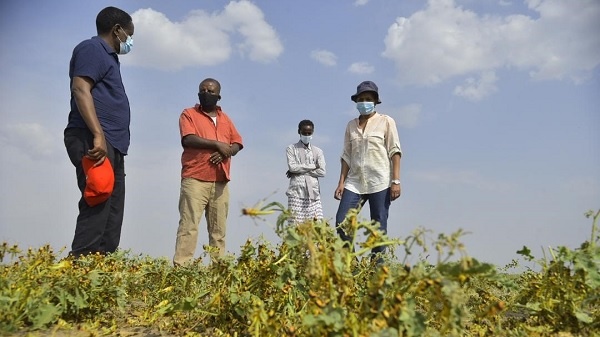
(FAO Ethiopia) – During a field mission to Afar from 18 to 20 September 2020, Mr. Oumer Hussein, Ethiopia’s Minister of Agriculture, Mr. Mandefro Nigussie, State Minister of Agriculture, and Fatouma Seid, the Food and Agriculture Organization of the United Nations (FAO) Representative in Ethiopia stressed the need to scale up Desert Locust operations in the Region.
“What we have been told and what we see on the ground is different. I realize that the problem is very serious. If we do not target the locusts now, I think we will face a bigger challenge in the neighboring regions,” said Mr. Oumer Hussein.
The aim of the field mission was to assess the Desert Locust situation and ongoing survey and control operations in the Afar Region.
Afar region is now the epicenter of the locust invasion and is experiencing active hopper band formation. The Ministry of Agriculture, with FAO’s support, is scaling up operations in the Region, to control the hopper bands as well as incoming swarms from Yemen. Recently, FAO repositioned two leased aircraft and one helicopter to Afar and another helicopter to Somali (Jigjiga) regions, to intensify survey and control operations.
Ms. Fatouma Seid, the FAO Representative in Ethiopia said, “We discussed with the Desert Locust experts and the community and identified the challenges and gaps in the operations. We will work together with the Ministry of Agriculture to address them”.
Besides the control operations, FAO provides funding for environmental and health monitoring of control operations and disseminates Standard Operating Procedures. Currently, FAO is providing farmers and pastoralists affected by Desert Locusts in Afar with agricultural inputs, training, and extension support. The Organization will also launch a cash transfer program in the Region in October 2020.
FAO’s Desert Locust control operations and livelihoods response program in Ethiopia are funded by the following donors: Africa Solidarity Trust Fund; Bill and Melinda Gates Foundation; European Civil Protection and Humanitarian Aid Operations; European Commission’s Directorate-General International Cooperation and Development; Louis Dreyfus Company; Mastercard Foundation; and Swedish International Development Cooperation Agency (Sida). Others are UN Central Emergency Response Fund; United Kingdom’s Department for International Development; United States Agency for International Development; and the governments of Belgium, Canada, China, Denmark, France, Germany, Netherlands, Norway, Russia, and Saudi Arabia through the Commission for Controlling the Desert Locust in the Central Region.
Source: FAO Ethiopia
